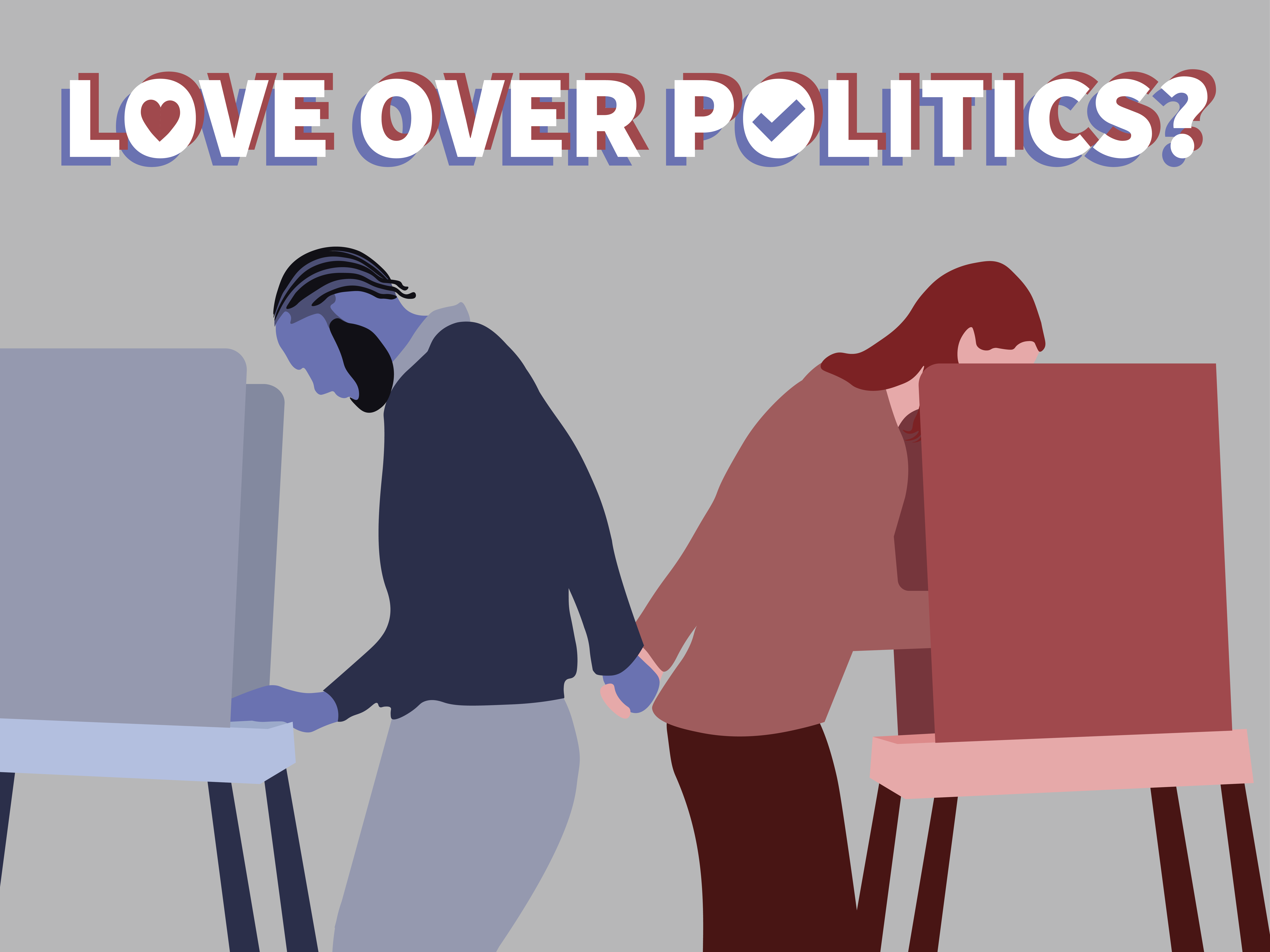Dear Abby: Election Day is coming up, and I’m kind of annoyed at my boyfriend. He’s voting against my political party. I told him that this makes me upset given some of the opposing candidate’s policies, but he won’t listen. I know I should probably agree to disagree, but that doesn’t sit right with me. Do you think we’ll ever be able to get past this?
What is it that they say you shouldn’t bring up at the dinner table? Money, religion, and… politics. We wouldn’t want to get “too controversial,” now would we? But with election season right around the bend, it’s impossible not to bring voting up.

Most young adults encounter their first political disagreements with their parents or extended family. However, things can become dicey as we start to enter more serious relationships.
What do you do if the person you’re seeing reveals that they are voting for the opposing candidate?
Everyone likes to champion the “agree to disagree” point and say that we should not let politics impact our relationships. But the more I think about what’s on the line on Nov. 5, I can’t help but wonder: Is it wrong to avoid dating someone who is voting differently from you?
TikTok has been buzzing with slideshows featuring children sharing pictures of themselves and their parents talking about “canceling out their vote” come election day. There is some humor to that because, as most of us know, there’s no changing our parents’ political decisions, much like how there’s no changing our relationship with them.
Given that you actually have a choice in your romantic partners, perhaps there is something to be said about cross-party dating.
Nature of relationship
I’m sure there are some couples that are perfectly successful and vote for different parties. However, what I am questioning is the nature of the relationship.
If you’re casually dating someone, then I don’t think voting will be much of a contentious topic. If you don’t really see a future together and are merely just enjoying one another’s companionship, you might let their party affiliation slide.
Subsequently, if you’re looking to enter a serious relationship, your political beliefs and affiliations may hold greater weight. Given the implications of some politicians’ beliefs and campaign objectives, a vote isn’t just some small quarry we can overlook.
With things like reproductive freedom and social equality on the line this year, there has never been a more important time to pay attention to who and what your partner is voting for.
As a young woman myself, dating a man who is voting for Donald Trump on Nov. 5 would be quite the oxymoron. If they love women so much, why would they vote for someone who boasts about being responsible for the overturning of Roe v Wade and the disposal of a landmark decision for reproductive freedom that ensured abortion was not left up to the states’ discretion.
What this all harks back to are beliefs and values — the very crux of what defines our character. When you cast your vote for a certain candidate, you’re echoing their beliefs and values, which reflect back on you.
I’m not saying that disagreements can’t create a window of opportunity to learn something new from your partner. However, having deeply held political convictions might make decisions about family planning, raising children and other long-term commitments more difficult.
I also have to add that if you think who you vote for should have no effect on your romantic relationship or friendships, I would check your privilege. Try to step outside of your bubble to better understand how others will be impacted.
You can’t overlook values
I know a lot of people who like to use their parents as an example of a relationship that can make it to the altar despite differing political beliefs, but I honestly think the dating landscape has changed so much in the past decade to the point where this argument no longer stands.
Marriage is no longer a woman’s pinnacle achievement in our current society. That being said, there isn’t as much pressure to settle down quickly while you’re still young.
For some people, a little healthy disagreement is good. But let me be clear: mixing red and blue doesn’t always create a royal purple. Small disagreements about policy is one thing, but possessing fundamentally different priorities and values is only a precursor for trouble in the future.
Part of being an adult is realizing that you have your beliefs and your partner has theirs, but what many don’t consider is the impact their vote has on other groups and what it says about their morals.
I think it would be a double standard to claim that you respect your girlfriend — and all other women — if you choose to cast your vote for someone who owns those words against them.
My point
I guess what I’m really trying to say is that the political love gap is real. You could say it’s a modern-day Montague and Capulet situation with feuds between the red and blue parties.
Everyone loves to ramble about how things are getting too political these days, but I think there are some spaces where we should welcome being political — and that includes relationships.
In my eyes, political affiliations are more than just a paper ballot. Behind them are sets of morals and attitudes that we hold. You don’t have to be like-minded in every topic in order to have a successful relationship, but there are some foundational beliefs that may be hard to overlook differences on.
You cannot tell someone you love them and then vote for someone who is actively trying to take their rights away. It is a privilege in and of itself to be able to separate relationships from politics — especially when not everyone can.
In the long term, it is worth it to consider these factors when involving yourself in a relationship.














